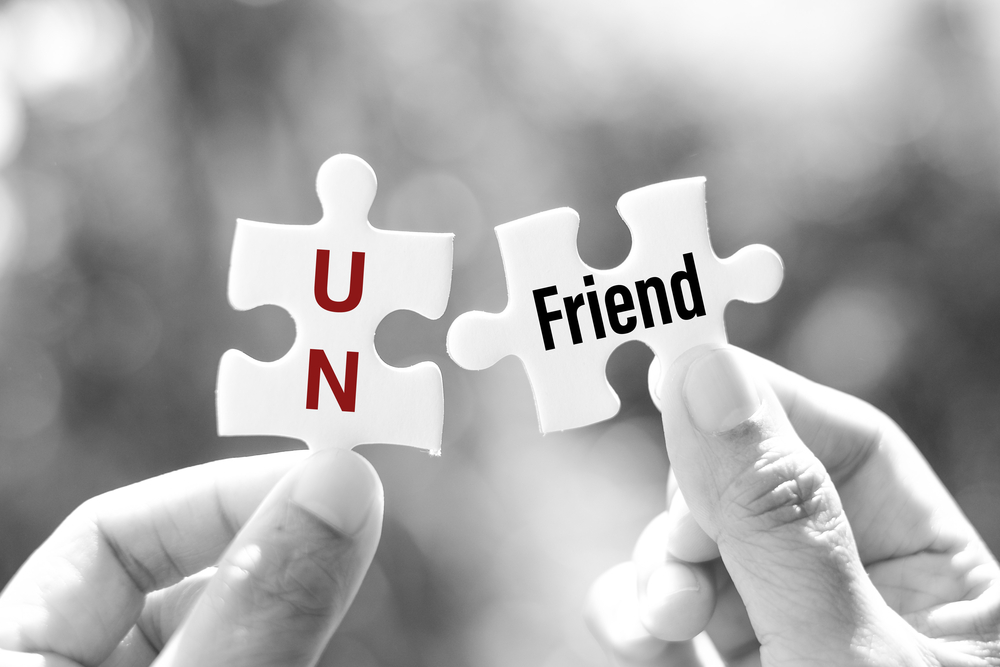 Opinions, beliefs, and values swirl around like a nasty tornado in this global pandemic with no sign of cooling down. I’m sure you’ve noticed there is no shortage of social media rows; heated exchanges between strangers, friends, coworkers and yes even family have surged when it comes to the “right” way of handling this crisis. Many people who I’ve spoken with have described muting, unfriending, or blocking people on social media channels because of the content some of their contacts have posted. I’ll admit that I’ve done the same to protect my mental health and peace of mind.
Opinions, beliefs, and values swirl around like a nasty tornado in this global pandemic with no sign of cooling down. I’m sure you’ve noticed there is no shortage of social media rows; heated exchanges between strangers, friends, coworkers and yes even family have surged when it comes to the “right” way of handling this crisis. Many people who I’ve spoken with have described muting, unfriending, or blocking people on social media channels because of the content some of their contacts have posted. I’ll admit that I’ve done the same to protect my mental health and peace of mind.
There are so many opinions trying to dominate social media: whether to continue wearing a mask or not, was the Trucker Convoy right or not, whether to be vaccinated and how many vaccinations are enough? Did you adhere to provincial lockdowns? Did you protest outside a hospital against Covid measures? All of these strong and passionate stances (some based on science and experts while others are based on the opinions of influencers and conspiracy theorists) leave me concerned about what all of this may mean for workplace interpersonal relations.
Understandably, there’s a lot of variation in thoughts and practices for navigating through these unprecedented times. Although so much has changed, there are parallels between the current divisions and quarrelling and what transpired around the time of the 2016 US election.
Back in 2016, there seemed to be a sudden and dramatic shift. Unexpectedly, divisive political ideologies begin to chip away at people’s core values, it was no longer the concept of “let’s agree to disagree,” instead, political and ideological framing became very black and white. That palpable discord felt and experienced by so many naturally extends to the places in which we work. At work, there is a fine line to be walked when it comes to expressing our values and political beliefs.
Fast forward to 2022. The divisions still linger, now compounded by a global pandemic. It is clear that pandemic life has divided friends, family, coworkers and even simple strangers on sidewalks the same way the Trump era ripped through people’s lives severing ties and straining relationships once thought to be solid.
A client who is eager to return to her place of work after hearing her office would be resuming business as usual and that masks would be optional told me:
“I was so excited to go back to work, to step off the elevator and see my former colleagues smiling without a mask on, Starbucks in-hand, welcoming each other back; maybe even hugging. When I expressed this desire to a close co-worker, she grew quiet over the phone. She revealed to me that it was people like me that made her feel like she couldn’t comfortably return to in-person work.”
This client was surprised that her desire to get back to the office with no Covid mandates or restrictions was offensive and even bordering on threatening to her workplace friend.
 All of this makes me worry that the transition back to the office is going to be extremely challenging. We have to co-exist peacefully with colleagues who have different perspectives on vaccination, masking and the issues raised by the truck convoy to Ottawa.
All of this makes me worry that the transition back to the office is going to be extremely challenging. We have to co-exist peacefully with colleagues who have different perspectives on vaccination, masking and the issues raised by the truck convoy to Ottawa.
It’s important to note that there is a legitimate threat to health, especially for people with underlying (and private) health concerns or who have close interactions with people who have fragile immunity. Should employees be forced to co-exist in the physical workplace with people who don’t care about catching or infecting others with Covid? After all this time and suffering, there are people who don’t believe Covid is any more serious than a cold.
Personally, I don’t think they should. For certain employees, the perceived threats of physical and emotional harm are real. Employers should consider making accommodations the same way they do for people with disabilities. Moreover, many employees have worked effectively remotely for over two years.
 Here’s an important consideration. If employees are extremely anxious about being in the physical workplace due to their fears and concerns about getting sick — or because it was such a relief to work from home away from discrimination and bullying — remember that these fears will diminish their ability to focus, in much the same way that covering at work redirects work energy into self-protection.
Here’s an important consideration. If employees are extremely anxious about being in the physical workplace due to their fears and concerns about getting sick — or because it was such a relief to work from home away from discrimination and bullying — remember that these fears will diminish their ability to focus, in much the same way that covering at work redirects work energy into self-protection.
Some suggestions to make the transition easier:
- A staggered return to work to give people a chance to adjust over time
- Offer the option of a hybrid work arrangement
- Keep the option of remote work in place permanently, even if it has to be reviewed on a case-by-case basis.
Further Reading
Here are a couple of articles about returning to work that I thought were worth sharing:
- COVID restrictions are lifting, but for some, anxiety remains (Susan Schwartz, Montreal Gazette, March 11, 2022)
- The Dos and Don’ts of Going Back to the Office (Dene Moore, Globe and Mail, April 11, 2022)
Do you want to discuss a career, HR, or training-related matter? Reach out today for a free and confidential initial consultation by phone, email, or via direct message on Twitter, Facebook or LinkedIn.
More than career coaching, it’s career psychology®.
I/O Advisory Services Inc. – Building Resilient Careers and OrganizationsTM.




